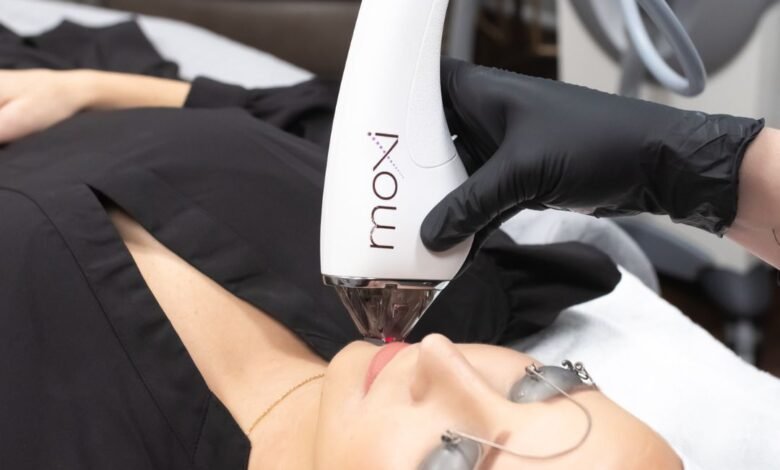
Laser Treatments in Abu Dhabi have gained significant popularity in the medical and cosmetic fields over the past few decades. From skin resurfacing to hair removal, lasers offer effective solutions for various concerns. However, with their rise in popularity, several myths and misconceptions have also surfaced. These myths often prevent individuals from seeking or fully benefiting from laser treatments. Let’s debunk some of the most common myths about laser treatments to clear the air and help you make informed decisions.
Myth 1: Laser Treatments Are Extremely Painful
One of the most widespread misconceptions about laser treatments is that they are incredibly painful. While it is true that some discomfort may occur during the procedure, most laser treatments are tolerable, especially with the help of topical numbing creams or cooling devices. Many people describe the sensation as a slight tingling or a rubber band snap on the skin, which is far from unbearable. Additionally, modern laser technologies have advanced significantly to make treatments as comfortable as possible.

Myth 2: Laser Treatments Are Only for Women
Laser treatments have become synonymous with beauty and skincare, but the idea that they are primarily for women is far from accurate. In fact, more men than ever are opting for laser treatments for a variety of reasons, including hair removal, skin resurfacing, and anti-aging treatments. Laser therapies are gender-neutral and can benefit anyone seeking effective solutions to skin or body concerns, regardless of gender.
Myth 3: Laser Treatments Are Only for Skin
While lasers are indeed commonly used for skin treatments, their applications extend far beyond skin care. Lasers are employed for a wide range of medical treatments, including vision correction (such as LASIK for eye surgery), dental procedures, and even to treat specific medical conditions like kidney stones or cancerous tumors. Their versatility makes lasers an indispensable tool in both aesthetic and medical fields.
Myth 4: Laser Treatments Are Only for Younger People
Many people mistakenly believe that laser treatments are only effective for younger individuals, but the truth is that lasers can work wonders for people of all ages. For example, lasers can reduce the appearance of age spots, fine lines, and wrinkles, making them an excellent option for mature skin. Additionally, laser treatments can help address issues like acne scars, pigmentation, and skin texture, regardless of age. The results depend on skin type, concern, and the specific treatment used.
Myth 5: Laser Treatments Provide Instant Results
While laser treatments can provide impressive results, they are not magic solutions that deliver overnight transformations. The effects of laser treatments may take time to fully appear, depending on the type of treatment and the individual’s skin condition. For instance, laser hair removal requires multiple sessions over weeks or months to achieve permanent hair reduction. Similarly, laser resurfacing for wrinkles or scars may take a few weeks to reveal optimal results as the skin heals and regenerates.
Myth 6: Laser Treatments Can Cause Scarring
One of the biggest fears surrounding laser treatments is the risk of scarring. While there is a small chance of scarring, the modern technology used in laser treatments significantly minimizes this risk. In fact, laser treatments are often used to reduce scarring, such as acne scars or post-surgical scars, by stimulating collagen production and resurfacing the skin. When performed by trained professionals, the likelihood of scarring is extremely low.
Myth 7: Laser Treatments Are Only for Aesthetic Purposes
While laser treatments are often associated with cosmetic procedures, they also have important medical applications. Lasers are widely used in dermatology to treat conditions like rosacea, psoriasis, and even certain types of skin cancer. Furthermore, lasers can be used in the treatment of hair loss (through low-level laser therapy), vision correction, and more. They are valuable tools not just for aesthetic enhancements, but for improving overall health and well-being.
Myth 8: Lasers Are Dangerous and Unsafe
Another common myth about lasers is that they are inherently dangerous and unsafe. When used by trained professionals, laser treatments are very safe. In fact, they are often more precise and less invasive than traditional surgical options. Lasers are designed to target specific areas of the skin or tissue, leaving surrounding areas unharmed. However, it’s important to choose a reputable provider with experience in laser treatments to minimize any potential risks.
Myth 9: Laser Treatments Require a Lot of Downtime
Some people avoid laser treatments because they believe the recovery time will be lengthy and inconvenient. While some types of lasers, such as those used for deep skin resurfacing, may require a few days of downtime, many other laser treatments involve little to no recovery time. For instance, laser hair removal and certain skin treatments can be performed with minimal downtime, allowing individuals to return to their normal activities immediately after the session.
Myth 10: Laser Treatments Are Only for Those with Darker Skin
Another common misconception is that laser treatments are only suitable for individuals with lighter skin tones. While it’s true that certain lasers are more effective on lighter skin, there are plenty of options available for those with darker skin tones. Advances in laser technology have made it possible to treat various skin tones and types safely and effectively. It’s important to consult with a professional who is familiar with your skin type to determine the best treatment options.
Myth 11: You Can’t Have Laser Treatment If You Have Sensitive Skin
Many individuals with sensitive skin shy away from laser treatments, assuming they will irritate or damage their skin. However, laser technology has evolved to include treatments specifically designed for sensitive skin. Gentle, non-invasive lasers can target delicate areas without causing irritation. Consulting with an experienced practitioner who understands sensitive skin will help ensure the appropriate laser treatment is selected for your needs.
Myth 12: Laser Treatments Are Only for Specific Conditions
Another myth is that laser treatments can only address specific conditions, like hair removal or acne scars. In reality, lasers can treat a wide array of concerns, from reducing the appearance of sun damage and hyperpigmentation to improving skin texture and reducing pore size. Laser technology is versatile, offering tailored solutions for many skin and body concerns.
Conclusion
Laser treatments offer a wealth of benefits, from aesthetic improvements to medical advancements, but they are often misunderstood due to persistent myths. It’s essential to separate fact from fiction to make informed decisions about whether laser therapy is the right choice for you. By understanding the truth about these treatments, you can approach them with confidence, knowing they are safe, effective, and available for various purposes.
Frequently Asked Questions
1. Are laser treatments painful?
Most laser treatments cause minimal discomfort. The sensation is often compared to a mild stinging or a rubber band snap. Numbing creams can be applied to enhance comfort during treatment.
2. How many sessions do I need for laser hair removal?
Laser hair removal typically requires multiple sessions, spaced a few weeks apart, to achieve optimal results. The number of sessions varies based on the individual’s hair type and the area being treated.
3. Can laser treatments work for all skin tones?
Yes, with advances in technology, lasers are now designed to treat a variety of skin tones safely. However, it’s essential to consult with a trained professional who can select the right laser for your skin type.
4. How long do the results of laser treatments last?
Results can vary depending on the treatment type. For example, laser hair removal can provide long-lasting results, while skin treatments may require maintenance sessions to maintain optimal results.
5. Is there any downtime after laser treatments?
While some more intense treatments may require a few days of recovery, many laser treatments involve little to no downtime, allowing patients to return to their normal activities right away.



